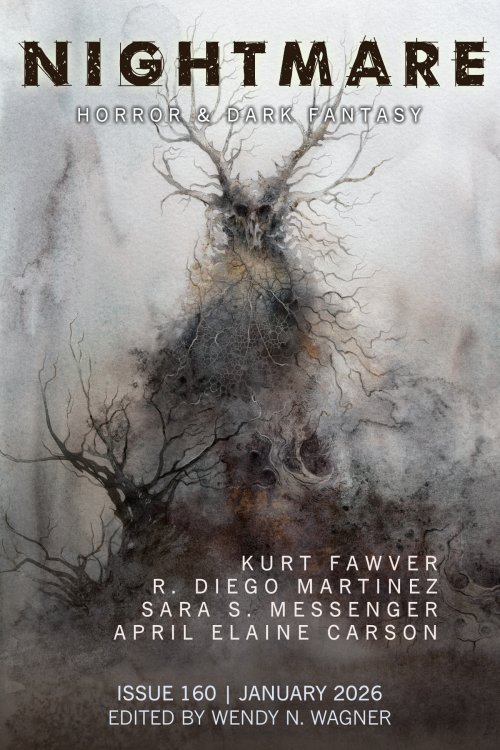The horror genre, perhaps more than most, is able to put us in touch with the more ancient aspects of our cultures. For example, in the UK, we often think of folk horror having hyper-realized pagan elements with a great deal of poetic license! Could you give us a little background to the older cultural aspects you’re drawing upon in this story?
I drew on some elements of African spirituality and cosmology, especially as it pertains to transmogrification, animalism, and the mysticism of the ancient religion of snake-worship prevalent in many communities in Africa and globally, including in the American Deep South, e.g, The House of the Lord Jesus church in Squire, West Virginia. I grew up on stories of villagers who could body-shift during certain masquerade festivals when the realms of the dead and living briefly merged. I also grew up in a village where our deity, Asata, was a python, revered but not feared by the villagers. “Oyili” is therefore my ode to all these ancient elements of African spirituality and lore that epitomised my magical childhood and continues to influence my works of African horror.
I also loved the cosmic elements. We could empathize with Kachi, and because of the fine prose, we were also viscerally immersed in his plight. How do you balance the redemptive expectations of Kachi’s story with the unsettling and, perhaps, unstoppable elements beyond the character’s control?
As a child listening to the mostly-terrifying Tales by Moonlight stories in my African village, I quickly realised that I enjoyed the horror stories that had a nice ending. Later, as I started consuming the written stories, the same preference also became apparent to me. Fairy tales like “The Little Match Girl” or “The Little Mermaid” held no joy for me, while “Red Riding Hood,” “Hansel and Gretel,” and “The Ugly Duckling” were amongst my favourites because they ended on a positive note. In the same vein, I realised that I loved the Stephen King stories that had a happy-ish ending, like Rose Madder, and hated the ones like Cujo, which left me feeling low at the ending; poor Tad died in the book after all, though thankfully not in the film adaptation. So, it was inevitable that my stories would follow the same trajectory of a positive ending against all odds, where the protagonists, having encountered tragedies, nonetheless, emerge changed but still standing at the end.
Most of my stories feature characters battling “unstoppable elements” beyond their control, be them natural or supernatural elements. This is why there is always a mixture of horror, fantasy, and magical realism in my works to enable me to find a redemptive outcome for my protagonists with every creative licence possible. In “Oyili,” I did the same with Kachi, without heavy reliance on deux ex machina, a common feature in folktales and fairy tales around the globe, which featured slightly in this short African horror story.
Not a question as such, but please feel free to comment! One interesting aspect of the story for me, is that we learn as Kachi learns, we feel the events unfold, and his exploration of his powers as he does. There is a lot of emotion in this, and we can feel his pain in his discoveries, and how he attempts to resolve the problems he has had a hand in creating.
Thank you for these kind words. When I read comments like this one, it tells me that I’ve succeeded in creating believable characters that my readers can connect with. For me, characters, more than anything else, have always driven my appreciation of fiction. When I, the conduit, manage to portray my characters authentically when they tell me their stories, it leaves an indescribable feeling of satisfaction; job well done, Nuzo. I’ve done them justice in my writing, and in whatever dimension they reside in they’ll know that I delivered their message the way they told it to me. They wanted immortality and I’ve given it to them. Now, they can let me be and their voices can finally stop ruining my sleep. I guess Kachi will also be pleased with how I’ve portrayed him to my readers in this story.
Thank you for the great read! Are there any other works readers could look for after reading Oyili? What else can we look forward to in the future?
My 3-novella collection, The Ghosts in the Moon, published by Titan Press, is due out in autumn 2024. The Thaumaturge: A collection of African horror stories, will be published later this year by Interstellar Flight Press, plus two more short stories in two upcoming anthologies. My agent also has two novels and a short story collection she’s hoping to sell to publishers in the future, so lots of great stuff coming out soon for my awesome fans.







